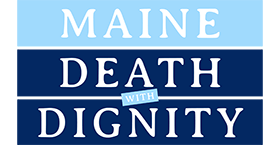Welcome.
Maine Death with Dignity is a 501(c)(3) non-profit providing services, fact-based education, and end-of-life advocacy to people who wish to actively explore the meaning of life through embracing the certainty of death.
A primary program of Maine Death with Dignity is connecting people to the information they need to make fully-informed decisions regarding all their end-of-life care options.
PLEASE NOTE:
The 2025 Amendment (Waiting Period Waiverability) went into effect on September 24, 2025. Read it here!
Get the facts.
Consistent with our mission to promote understanding of medical aid in dying, we highly encourage everyone to thoroughly inform themselves about the Maine law through fact-based education. Contact us to arrange a community discussion or training for your staff.
Mainers approaching the end of life deserve medical care that maximizes their comfort, respects their values, and addresses their concerns while continually seeking to optimize meaningful quality of life. Goals, preferences, and priorities surrounding care at the end of life are unique and vary from person to person.
When faced with a terminal illness, some people want aggressive life-prolonging interventions to the very end. Many want comfort measures only. Still others, seeking to control the time and manner of death, find reassurance in having a life-ending prescription available to them, even if they ultimately choose not to use it.
Death with dignity, or medical aid in dying, is an important part of palliative medicine in Maine.
Personal goals and priorities make it essential throughout the course of illness that a person receive responsive care based on shared understandings, fully informed decisions, and repeated assessment of changing needs and concerns. Excellent palliative and hospice care remain the gold standard for people approaching the end of life, and we encourage everyone to explore accessing these valuable services.
Aid in Dying is an emerging branch of palliative medicine, and Maine’s Death with Dignity Act is fully compatible with hospice (comfort care). It is one component of a continuum of care. A vast majority of patients (about 90%) who choose aid in dying are also enrolled in and receiving hospice care at the time of their death.
Be aware that some hospice organizations and healthcare providers are morally opposed to aid in dying, and you may experience stone-walling while trying to get help. They have no right to prevent your access to the kind of end-of-life care you want.
Contact us if you are not getting the information you need to make a fully informed decision.
Are you a Veteran?
Please note that the federal government prohibits its employees from practicing aid-in-dying medicine, so your USVA Togus physician(s) cannot help you qualify, even if they want to. If that appalls you, use our simple tool to send a letter of protest to your elected officials in Washington DC. If you need help finding a physician who can support your decisions, please contact us.
Do you rely on Medicare?
Sad news, then. The federal funding restriction means you cannot use Medicare to pay for the cost of aid in dying services or medidcation. That won’t change if we don’t fight back. Use our simple tool to send a letter of protest to your elected officials in Washington DC. If you want to learn more about the federal funding restriction, please contact us.
It’s your death. Go ahead, take charge.
Because, you know…you’re going to die. In fact, you’re dying right now, one breath at a time. Talking about that isn’t what kills you.
